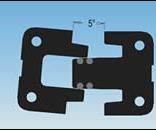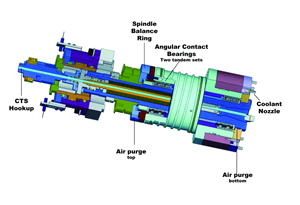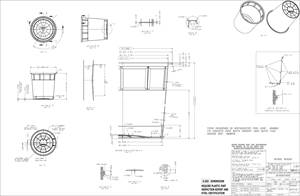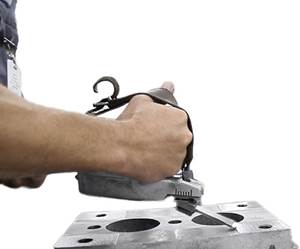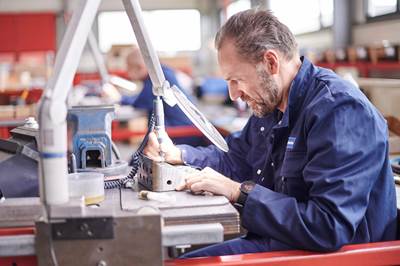Collaborative Engineering Drives Quality Mold Solutions
Advanced engineering and tooling teams collaborate to train, design, develop and deliver high-quality, cost-effective molds efficiently, ensuring perfect parts and faster launches.
Share
 MPC Advanced Machining
MPC Advanced Machining Who is MPC Advanced Machining?
Darryl Gratrix, Tooling Manager, Molded Precision Components: MPC Advanced Machining is a division of Molded Precision Components (MPC) that specializes in high-precision mold building and CNC machining services. This Division has been operating for several years as part of the broader MPC company, which has a rich history dating back to its founding in 1980. It has been under the current ownership since 2006.
MPC Advanced Machining operates out of a state-of-the-art facility that spans over 70,000-square-feet. The two facilities are located at 165 and 239 4th Line South, Oro-Medonte, Ontario, Canada. Included are engineering offices, metrology and inspection labs and two machine shops. The facility is equipped with cutting-edge technology and advanced machinery, including high-speed (CNC machine centers (42,000 rpm), wire and sink CNC EDM and precision grinding from suppliers such as GF Machining Solutions, System 3R and Mitutoyo.
The division employs a team of approximately 20 highly skilled professionals, including moldmakers, engineers, designers, machinists and apprentices. The entire MPC company has a workforce of around 85 employees with a significant portion dedicated to the machining division. We currently have one moldmaker apprentice, two machinist apprentices and one millwright apprentice.
This team is involved in the design, development and maintenance of high-precision molds, including multi-cavity and complex molds used in various industries such as automotive, medical and consumer goods. We specialize in producing molds and molded parts for the most demanding applications, most often tight tolerance and functionally critical parts such as gears, housings and fittings. We produce some highly complex molds requiring insert molding and over molding.

MPC Advanced Machining specializes in manufacturing molds and molded parts for the most demanding applications, most often tight tolerance and functionally critical parts like this innovative cube mold technology that enables multi-material injection and efficient high-volume production through synchronized rotation.
We build complex multi-cavity molds, including sophisticated tool actions, rotary cores, hot runner systems, valve gates and three-plate tools. We also have developed gear tooling technology to make all types of precision gears including worm, helical, spur, sector and internal gears. We can design and build molds with up to 32 cavities.
This division offers various machining services, including CNC milling, turning, wire and sinker EDM, precision grinding and mold assembly. We also offer inspection, measurement and reverse-engineering services including CMM, 3D blue-light scanning and highly detailed reporting. Last but not least, we provide mold repair, maintenance and engineering support to ensure that molds operate at peak efficiency.
What are your chief competitive advantages?
Gratrix: Our chief competitive advantage lies in our ability to deliver highly precise and complex machining solutions, supported by a team of skilled professionals and state-of-the-art technology. However, other shops have similar equipment, so our main edge comes from the processes and systems we have implemented to fully utilize this equipment, often achieving better results than what the manufacturer advertises.
For example, we program and set up our FORM200 sinker EDM using Cimatron’s EDM package, unlike most companies that still do it manually, which can lead to numerous data entry errors. We measure 100% of our electrodes on our tool room CMM and then transfer all the offsets electronically to the sinker EDM using software developed by our CMM programmer/operator.

CNC milling and sinker EDM machines use multi-pallet automation with robotic tending to run parts fully unattended. This technological shift has allowed MPC Advanced Machining to reduce lead times, improve consistency and take on more complex projects with greater accuracy.
We also have team members in the tool room and engineering department who do computer programming as a hobby. We have been able to harness their passion for programming and align it with our company's needs. On top of that, we have employees who are more satisfied with their jobs because they’re able to combine their passion with their work. All of this enables us to consistently meet the rigorous standards of industries like automotive and medical, ensuring exceptional quality and reliability in every project.
How has the company most recently changed how it uses technology?
Gratrix: In the past two years, we have adopted advanced automation and robotics in our machining processes, significantly enhancing production efficiency and precision. Our CNC milling and sinker EDM machines are now using multi-pallet automation with robotic tending to allow us to run parts fully unattended. This technological shift has allowed us to reduce lead times, improve consistency and take on more complex projects with greater accuracy.
Key machines in our facility include a GF FORM200 sinker EDM, GF Mikron HSM500, 3R WorkPartner automation unit between a FORM200 and HSM500 and a Mitutoyo Stratos 540 CMM. Key software includes Cimatron-Electrode design, sinker EDM programming, milling CAD/CAM, Solidworks-Design, Esprit for wire EDM programming and various MPC-developed programs. This software implementation has helped increase our throughput. Our record for setting up electrodes in one day is 70, which is considered impressive for those familiar with sinker EDM.
“But it’s really the smiles on the faces of the employees that is the biggest change. That’s honestly the thing I’m most proud of in our toolroom. Over my 11 years here at MPC, the culture change has been remarkable.”
How have you changed your general approach to the business?
Gratrix: In the past two years, we have strategically focused on expanding our services beyond internal projects by actively attracting outside business. This shift began with establishing MPC Advanced Machining as a dedicated division, allowing us to leverage our high-precision capabilities and industry expertise to serve a broader range of customers and industries.
In July 2024, we implemented ProShop as our tool room ERP software, improving our operations through efficiency, automation and real-time data access. This paperless system streamlines everything from quoting and scheduling to production tracking and quality management, minimizing manual input and reducing errors. With real-time visibility into production processes and equipment use, we can quickly adapt, reduce downtime and make data-driven decisions. Its quality management tools ensure we consistently deliver high-precision products and the customizable and scalable features support our growth, ensuring optimized processes as capabilities expand, particularly with our cube technology.

The company motto is simple: “Our purpose isn’t just to make plastic parts — it’s to create a workplace where people are treated well and can thrive.”
But it’s really the smiles on the faces of the employees that is the biggest change. Honestly, that’s the thing I’m most proud of in our tool room. Over my 11 years here at MPC, the culture change has been remarkable. The team genuinely enjoys coming to work now, and we have fun working together. What’s even more exciting is that we’ve recently been able to extend that positive culture to our relationship with the engineering department, which has historically been a challenge in most manufacturing environments. As we all know, the tension between tool rooms and engineering is pretty infamous, but we’ve broken down those barriers. Now we’re working more closely and effectively than ever.
When joining MPC, the company aimed to create a unique culture, different from typical manufacturing environments. However, some initial behaviors contradicted this vision, particularly within team interactions. Leadership acknowledged that achieving the ideal culture was a work in progress and took steps to address the issues. With a focus on leading by example and creating a respectful environment, efforts to promote positive change became more effective. Over time, changes in leadership and addressing toxic behaviors contributed to a healthier and more collaborative workplace culture. We're not perfect, but we’ve built a team that enjoys working together. While differences remain, especially between older toolmakers and younger engineers, I emphasize the importance of mentoring. Our experienced team is responsible for guiding and training the next generation, which helps strengthen collaboration across departments.
One of my proudest moments was hearing a student say MPC stood out because our employees were happy and engaged, unlike other shops. Our owner’s belief is simple: our purpose isn’t just to make plastic parts — it’s to create a workplace where people are treated well and can thrive.
How are you addressing the skills gap?
Gratrix: MPC is addressing the skills gap by partnering with the Simcoe County District School Board and the Simcoe Muskoka Catholic School Board, and participating in the Ontario Youth Apprenticeship Program (OYAP). This initiative allows high school students to begin their apprenticeship training in skilled trades while earning their diplomas. We offer Advanced OYAP for Precision Metal Skills, where students complete a co-op during their final semester of high school and start their Level 1 apprenticeship schooling at Georgian College. This gives them a significant advantage by finishing Level 1 and gaining about 1,000 apprenticeship hours before graduating.
“Our main edge comes from the processes and systems we have implemented to fully utilize our equipment, often achieving better results than what the manufacturer advertises.”
We also host tours for high school guidance counselors to introduce them to modern manufacturing. Many are surprised by how clean and advanced our facility is, and we're now part of the field trip roster for Simcoe County high schools. I also participate in professional development events for high school teachers to promote skilled trades education and clarify employer expectations.
One of my personal goals is to introduce two to three weeks of skilled trades curriculum into Ontario’s mandatory Grade 10 careers course. This would ensure all students are informed about the opportunities in trades.
MPC also participates in local events like the LEVEL UP skilled trades open house and the Ontario Apprenticeship Summit. We maintain a strong relationship with Georgian College, where 23 of our 75 employees are graduates, and I serve on the Program Advisory Committee for Precision Skills to help ensure the program produces competent graduates.
We actively promote careers in skilled trades through community outreach and social media, emphasizing the rewarding opportunities in machining to attract and develop the next generation of skilled professionals.

The experienced team at MPC guides and trains the next generation of moldmaking professionals and helps to improve cross-departmental collaboration.
Describe your apprenticeship program.
Gratrix: We have implemented a robust apprenticeship and training program, partnering with local schools and industry organizations to nurture talent from the ground up. Our apprenticeship and training program is designed to develop skilled trades professionals through hands-on experience, mentorship and structured learning.
Six key aspects of the program are:
- Provides a combination of on-the-job training and classroom instruction. Apprentices work alongside experienced tradespeople to gain practical, real-world experience while also receiving formal education in technical skills, safety protocols and industry best practices.
- Collaborates with local colleges and programs to provide apprentices with access to high-quality education. This partnership allows apprentices to complete their in-class training while working, ensuring they learn the latest industry standards and technologies.
- Pairs apprentices with experienced mentors who guide them through the learning process. These mentors provide personalized instruction, share industry insights and help apprentices develop both technical and soft skills needed to succeed in the field.
- Emphasizes advanced machining techniques to prepare apprentices to work on complex, high-precision projects.
- Helps apprentices earn certifications in their trade, such as a Red Seal Certification, which is nationally recognized across Canada.
- Supports ongoing development through continued education, specialized training and opportunities to upskill in new technologies and areas of expertise.

Cube technology improves injection molding by providing enhanced precision and consistency, enabling the production of complex geometries with greater efficiency and reduced cycle times, ultimately leading to higher-quality molded parts and increased productivity.
Share the most interesting mold project your company was awarded.
Gratrix: We were awarded a notable project involving the development and implementation of innovative cube mold technology for the automotive industry. The cube technology offers significant advantages to customers by allowing multi-material and multi-component injection molding in a single cycle. This approach results in faster production times, increased efficiency and lower costs by consolidating multiple processes into one machine cycle. The cube mold rotates between different stations, enabling simultaneous injection of different materials or colors, overmolding or even the production of two different parts at once.
This technology is especially beneficial for high-volume production, as it reduces the need for secondary operations and increases overall throughput, ensuring faster delivery of high-quality, complex parts. Customers in industries such as automotive, medical devices and consumer products benefit from improved product design flexibility, reduced lead times and enhanced cost-effectiveness.
One particular project required the design and manufacture of a highly efficient cube mold system capable of producing multiple parts simultaneously, significantly reducing cycle times and increasing production efficiency. The success of this project showcased our ability to deliver cutting-edge solutions that meet the demands of high-volume production environments, further establishing the company as a leader in advanced tooling and manufacturing technologies.
Related Content
-
Solving Mold Alignment Problems with the Right Alignment Lock
Correct alignment lock selection can reduce maintenance costs and molding downtime, as well as increase part quality over the mold’s entire life.
-
Machining Center Spindles: What You Need to Know
Why and how to research spindle technology before purchasing a machining center.
-
It Starts With the Part: A Plastic Part Checklist Ensures Good Mold Design
All successful mold build projects start with examining the part to be molded to ensure it is moldable and will meet the customers' production objectives.
Related Content
Solving Mold Alignment Problems with the Right Alignment Lock
Correct alignment lock selection can reduce maintenance costs and molding downtime, as well as increase part quality over the mold’s entire life.
Read MoreMachining Center Spindles: What You Need to Know
Why and how to research spindle technology before purchasing a machining center.
Read MoreIt Starts With the Part: A Plastic Part Checklist Ensures Good Mold Design
All successful mold build projects start with examining the part to be molded to ensure it is moldable and will meet the customers' production objectives.
Read MoreThe Benefits of Hand Scraping
Accuracy and flatness are two benefits of hand scraping that help improve machine loop stiffness, workpiece surface finish and component geometry.
Read MoreRead Next
Innovation, Diversification and Integration Guide Mold Builder Growth
Quality Tool and Die team discusses the journey from a small automotive tool shop to a diversified full-service moldmaking and plastic production facility.
Read MoreInternational Partnership Improves IBM Preform Precision
Hammonton Mold Co. and ADOP France team up to bring injection blow mold preform design and service to the next level.
Read MoreA Passion for Innovation in High-Precision, Multi-Cavity Moldmaking
Boucherie uses its dedicated R&D facility to develop new mold, machinery and automation technologies to stay ahead of the competition.
Read More










